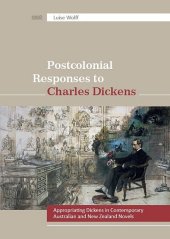 Neuerscheinungen 2018Stand: 2020-02-01 |
Schnellsuche
ISBN/Stichwort/Autor
|
Herderstraße 10
10625 Berlin
Tel.: 030 315 714 16
Fax 030 315 714 14
info@buchspektrum.de |

Luise Wolff
Postcolonial Responses to Charles Dickens
Appropriating Dickens in Contemporary Australian and New Zealand Novels
2018. 214 S. 21 cm
Verlag/Jahr: WVT WISSENSCHAFTLICHER VERLAG TRIER 2018
ISBN: 3-86821-722-3 (3868217223)
Neue ISBN: 978-3-86821-722-3 (9783868217223)
Preis und Lieferzeit: Bitte klicken
Connections between Charles Dickens and Australia and New Zealand are not perfectly obvious. Still, a number of Australian and New Zealand writers have turned towards Dickensīs work in the past decades. This study traces these connections between the Victorian author and contemporary Australian and New Zealand writing as it provides detailed textual readings of five Australian and New Zealand novels that appropriate Dickens and his work.
Proceeding from the question how far these texts write back to Dickens, two significant, recurring themes are considered: first, the novels explore the dynamics of dysfunctional families as they appropriate the Dickensian motif of orphanhood as well as the Australian motif of the lost child. Second, all texts focus on reading and writing processes and thus address questions about the primacy of canonical writing and the authority over stories.
Superseding a counter-canonical reading of the novels, the present study draws on theories of adaptation and appropriation, transnationalism, settler colonialism and diaspora. It shows how, rather than representing rewritings of Dickensīs work, the texts place Dickens in diverse historical and cultural contexts and thus draw attention to his global, transnational appeal.
Table of Contents
Introduction 1
1. Theoretical Premises 19
1.1 Counter-Canonical Discourse: Criticism and Expansions 19
1.2 Adaptation Theories, Transnation(alism), Diasporas 26
1.3 Settler Cultures 30
2. The Convictīs Return: Peter Careyīs Jack Maggs 35
2.1 An Australian Novel 36
2.1.1 London: Imperial Centre and Hell 36
2.1.2 Maggsīs Returns: Cultural Cringe and Emancipation 40
2.1.3 The Ending 43
2.2 Dysfunctional Families 45
2.3 The Ethics of Writing 49
2.3.1 The Author within the Text 49
2.3.2 The Death of Maggs 52
2.3.3 Fiction as Theft 54
2.3.4 "a different type of story": Jack Maggs as Writer 56
2.4 References to Australian Literature 58
2.5 Writing Back to Dickens? 60
3. Pacific Dickens: Lloyd Jonesīs Mister Pip 66
3.1 Border Crossings: Towards Transnational Readers 67
3.1.1 Versions 1 and 2: Cultural and Generational Borders 67
3.1.2 Version 3: Retrieving Dickens 70
3.1.3 Version 4: Mr Wattsīs Story 72
3.1.4 Version 5: Matildaīs Story 78
3.2 Functions of Literature 81
3.2.1 Escape and Immersion 81
3.2.2 "lazybone dogs": Reading as Instruction 85
3.3 Migration 87
3.4 Conclusion 92
4. Appropriating History: Richard Flanaganīs Wanting 94
4.1 Challenging Official Memory 98
4.1.1 The Victorian Age Revisited 98
4.1.2 Victorian Heroes Rewritten 100
4.1.3 Retrieving Forgotten Histories 105
4.2 The Power of Words 106
4.2.1 Dickens 106
4.2.2 Mathinna 118
4.3 "a rigid programme of improvement": Mathinnaīs Education 123
4.4 Reason and Desire 127
4.4.1 "īher future is bright indeedī":
George Augustus Robinson and Mathinna 129
4.4.2 "the love of a mother for her child": Lady Jane and Mathinna 132
4.4.3 "an exotic object of amusement": Sir John and Mathinna 134
4.4.4 The Image of the Black Swan: Leda and Rowra 137
4.4.5 "neither white nor black": Mathinna 140
4.4.6 "his undisciplined heart": Dickens and Ellen Ternan 142
4.5 Othering Places: North and South 144
4.6 Conclusion 148
5. Female Artists: Carmel Birdīs The Bluebird Café and
Gail Jonesīs Sixty Lights 150
5.1 Carmel Birdīs The Bluebird Café 150
5.1.1 Copperfield and Other Curiosities 152
5.1.2 Virginia and Dickens 156
5.1.3 The Lost Child 158
5.1.4 Tasmanian Dickens - Dickensian Tasmania 165
5.2 Gail Jonesīs Sixty Lights 165
5.2.1 Orphanhood 167
5.2.2 Migration: Australia, England, India 169
5.2.3 "this metaphysical meeting space": Reading and Storytelling 172
5.2.4 References to Dickens 176
5.3 Conclusion 179
6. Strategies of Appropriating Dickens: A Comparison 181
Bibliography 187


